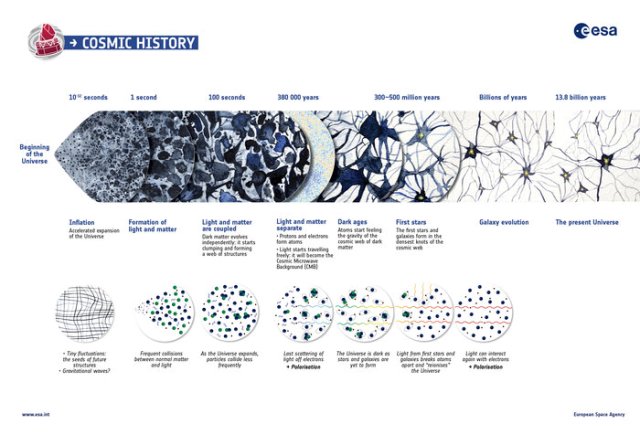Feb 16 2015
When the Universe has a long, long history of 13.8 billion years, how close can we pin point when the first stars appeared?
 The history of the Universe. Copyright ESA
The history of the Universe. Copyright ESA
Scientists from the Planck collaboration, including PHAS Professor Dr. Douglas Scott, post-doc Jim Zibin, and grad students Dago Cotreras and Ali Narimani, have been analyzing data from European Space Agency’s Planck Space Telescope to learn about our Universe – its structure, properties, and history – with great accuracy. Planck measures the fluctuations of Cosmic Microwave Background (CBM) - the “fossil light” left by the Universe only 380,000 years after the Big Bang happened. CBM information is collected through the Planck telescope and converted to accurate maps of the microwave sky with Planck's two highly sensitive detectors. Between 2009 and 2013, Planck has surveyed our sky eight times, providing us with an unprecedentedly rich data about the Universe.
In a recently published paper, Planck data showed that the “Dark Ages” of the Universe – a period when the early Universe is “foggy” - ended as the first stars began to shine around 550 million years after the Big Bang. This is more than 100 million years later than previously thought.
"There is a tell-tale signature in the Cosmic Background Radiation that tells us when the first stars emerged, thereby ending an epoch known as the Dark Ages," said Douglas. "Our understanding of the Universe is based on a few parameters that we are able to measure—and we just improved those few numbers dramatically." This new data on the age of the first stars can help reconcile some previously inconsistent explanations of the period following the Dark Ages (called “epoch of reionisation”). In addition, this later end of the Dark Ages means that it might be easier to detect the earliest galaxies using the latest space observatories such as the James Webb Space Telescope.